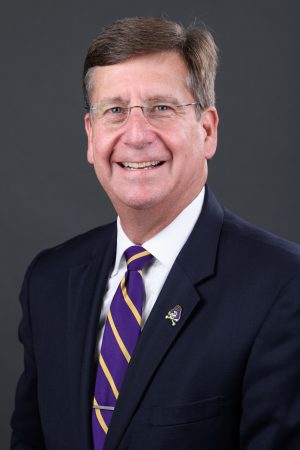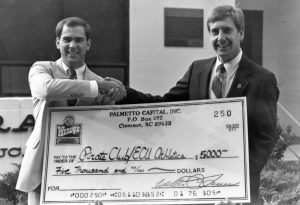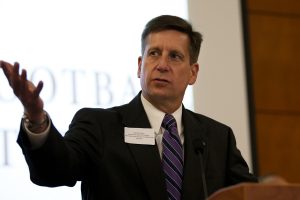Until you spend an hour with Lee Workman, you might not understand the thing that has driven him through 34 years in the East Carolina athletic department — his relationships with student-athletes, coworkers, fans and others. You also might not realize that the traditions that have become ubiquitous in the Pirate Nation — the ECU tailgating culture, the Pigskin Pigout and the Dowdy-Ficklen first down call, to name a few — didn’t just develop by coincidence or happenstance. They became part of the Pirate culture through the concerted efforts of Workman and others.
Since he arrived on campus in 1984 for a ten-month internship that turned into a career spanning six athletic directors, Workman has quietly lived into his name. Through the drastic peaks and valleys that have defined the landscape of Pirate athletics, Workman has been the man working steadily to create something enduring. When he retires at the end of this month, he will leave a monument to Pirate excellence and identity that will far outlast his three-and-a-half decades in ECU athletics.
From marketing intern to assistant marketing director to a progression of assistant and associate athletic director responsibilities to acting chief operating officer, Workman has had a hand in licensing, ticketing, branding, promotions and the planning of special events like bowl games and NCAA baseball regionals. He has been in charge of the athletic department’s human resources, strategic planning and policy administration, and he is one of a handful of key players who holds the institutional memory of a rich and varying period in the world of Pirate sports.
For fans who have not been witness to the changes during Workman’s tenure, it is extraordinary to consider the meaningful rituals that have germinated and evolved under his watchful eye. While emphasizing the importance of consistency while building a brand, Workman has continually sought ways to make the Pirate experience more meaningful for student-athletes and fans alike. Examples of the traditions he has helped birth include:
- Pigskin Pig-Out. Dave Hart, the ECU marketing director in the mid-‘80s who hired Workman for his initial internship and has mentored him throughout his career, put his young protégé in charge of the second-ever Pig-Out spring festival. That second event in 1985 featured the first carnival, fireworks display and golf tournament, as well as appearances from “Miller Lite All-Stars” Boog Powell and Ben Davidson, retired pro athletes who Workman recruited to make a TV commercial for Pirate season tickets while they were in town.
- Tailgating. Workman grew up in the rabid tailgating town of Knoxville, TN, but when he arrived in Greenville he noticed that the majority of football fans arrived at the stadium just before game time and left right after the contest had ended. Determined to change that, he and Hart launched “Ain’t It Great To Tailgate?” The multi-year campaign featured giveaways for tailgaters, contests for those with the most elaborate tailgating setups and other promotions designed to multiply the number of fans lingering for hours in the lots surrounding the stadium before kickoff.
- Cannon Firing. A cannon had been featured in the Pirates game-day experience in the early ‘70s, and when Workman learned that fact he devoted himself to the attempt to bringing the artillery back. Avid ECU fan Ken Howard told Workman that he had a replica cannon that could be outfitted for use at home games, and Workman enlisted him to prepare the cannon and shoot it whenever the Pirates scored. Howard manned the gun for about a decade before cadets from ECU’s Army ROTC program took over. In 1999 Howard’s cannon was replaced with the model that is still used today.
- First Down Call. Workman remembers a conversation in the early ‘90s with retired stadium announcer John C. Moore, who had a radio background and was determined to remain neutral in his calls. “We wanted him to be neutral with a purple shade,” Workman said, “And I said, ‘Let’s think of some things around our first downs, other than just your normal call.’” The two came up with a script that would call for Moore to spice up his call for key first downs, but the way that moment unspooled was somewhat unscripted. Moore had to cough after speaking the low, guttural, “First Down,” so he moved away from the microphone before saying, “Pirates.” The pause caught on, the crowd started to join in, and a beloved tradition was born.
- Stadium Videos. An early collaboration in bringing video to Pirate game days was formed between the athletic department and Daktronics, a company that also created videos and graphics for the Tampa Bay Buccaneers. Workman was instrumental in guiding Daktronics, and later other production companies, in creating entrance videos for the team, incorporating ever more elaborate Pirate tie-ins especially when the first “Pirates of the Caribbean” movie was released in 2003. Soon purple haze was incorporated into the pregame regimen, and the mid-2000s brought the introduction of “No Quarter.” Through every significant spirit-building idea and tradition, Workman was at the center working on big-picture vision and logistical details alike.
A few photos of Workman on the job over the years courtesy of ECU Media Relations:
(Click a photo to display larger view or to start slide show)
In recent months, even as he has been influential in re-establishing a solid leadership foundation for the athletic department with his role in the hiring process of athletic director Jon Gilbert and football coach Mike Houston, Workman has engaged with staff members to help encourage the retention of traditional practices and images while continuing to innovate. It’s a delicate balance that the top college athletic programs in the country have achieved — making their brands instantly recognizable even as they look for ways to grow.
“One of the keys to branding is consistency,” he said “A sustainable brand is consistent. That’s one of the things we maybe didn’t do as well as we should have through the years, but if you look at the most well-known brands, athletically and non-athletically, they’re consistent. I think your fan base, your constituency, that’s what they come back for. That’s what they’re expecting to see. They’re expecting to see their school, their traditions, their culture. Whether you came here in the ‘60s or you graduated in 2018, there should be a consistent culture there.”
But through every improvement he has encouraged, every committee he has participated in and every milestone he has witnessed, Workman has never lost sight of his driving motivation in this work — the people. By forging strong connections every step of the way, Workman has guaranteed his influence on the Pirate Nation.
“The most valuable thing to me is the relationships that have been built — students, staff, supporters, throughout the whole time, over 34 years,” he said. “To me, it’s the people and the relationships. We can build things, and renovate things, and even win championships. It’s still about the people and the relationships.”
For evidence that relationships are central to who Workman is, consider his first and last game-day interactions as a member of the ECU athletics staff. When he arrived as an intern in 1984, he walked out into the parking lot near Scales Fieldhouse before the first Pirates game he witnessed and struck up a conversation with two families tailgating near a silver van — the Misenheimers and the Canupps. This November 17, before the game against Connecticut that marked Workman’s last home matchup before he transitions from administrator to superfan, he went to visit those two families again. “That last game, I knew where they still parked, and I went out to see them,” he said, his voice breaking. “That’s where the emotions start. “There’s 34 years, of some loyal folks, and relationships — the very first home game and the last home game when I was a full-time staff member, who I was able to go see.”
He hasn’t targeted his next steps yet, although he is confident that he isn’t heading for a rocking chair anytime soon, he said. He will spend more time with his wife Jan, and their children and granddaughter, and he is confident that he will embrace more opportunities to use the skills and experience that served him through so many decades in the Ward building. Regardless of what’s next, he wants to ensure continued opportunities to make a difference in the lives of people.
“I’ve got a lot of energy still left in me, and I just need to determine where that’s going to be, where I’m going to put that next piece of energy in,” he said. “That will all start to come clear. We’ll see what doors open and what opportunities come.”




Did not realize that you were leaving, you will be missed. Keep on swimming.